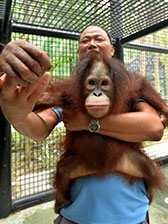
Helping hand:
Smart but timid Wah Wah, identified easily by her longer hair, clings to to Mr Lai.
Helping hand:
Smart but timid Wah Wah, identified easily by her longer hair, clings to to Mr Lai.
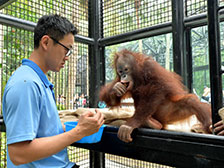
Tasty treat:
Wan Wan helps himself to some fruit under the watchful eye of Mr Mak.
Tasty treat:
Wan Wan helps himself to some fruit under the watchful eye of Mr Mak.
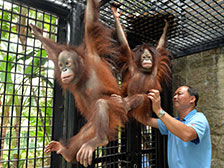
Leaps of faith:
The twins delight in exploring the climbing structure in their habitat, knowing Mr Lai is ready to catch them should they fall.
Leaps of faith:
The twins delight in exploring the climbing structure in their habitat, knowing Mr Lai is ready to catch them should they fall.
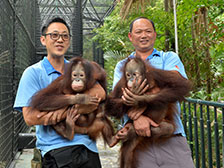
Creature comforts:
Amenities Assistant Mak Chi-wah and Senior Amenities Assistant Lai Yuk-ming treat the orangutan twins as their own children, with extra care.
Creature comforts:
Amenities Assistant Mak Chi-wah and Senior Amenities Assistant Lai Yuk-ming treat the orangutan twins as their own children, with extra care.
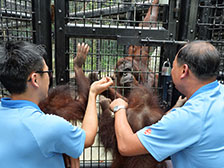
Meeting mom:
Staff bring the twins to see their mother Raba regularly, to let her smell them, hoping she will eventually treat them as family.
Meeting mom:
Staff bring the twins to see their mother Raba regularly, to let her smell them, hoping she will eventually treat them as family.
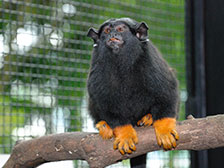
The newcomers:
The Red-handed Tamarin from Germany was introduced to the zoo in February.
The newcomers:
The Red-handed Tamarin from Germany was introduced to the zoo in February.
Orangutan toddlers step out
April 18, 2014
Born-in-Hong-Kong Bornean orangutan twins Wan Wan and his sister Wah Wah are now two years and nine months old. As they make the transition from their indoor nursery to spending more time outdoors, visitors to the Hong Kong Zoological & Botanical Gardens may have a chance to get close to them.
After breakfast each weekday morning, the dynamic duo are brought from the nursery to an outdoor habitat. There, they spend hours exploring the climbing structure, with swings, ropes and hammocks for them to play on.
Since December, they have spent about six hours each weekday in the outdoor habitat to gradually adapt to outdoor life. They have fruit during the daytime - such as oranges, grapes, bananas and figs - which is good for their digestive systems.
Wah Wah, easily identified by her longer hair and smaller build, is smart but shy, often hiding behind her brother. She weighs 12kg, while Wan Wan weighs 17kg. He protects his sister, holding her hand as they walk around the outdoor habitat before they start to climb and play.
Human caretakers
The twins have grown healthy and active with the help of their caretakers, Senior Amenities Assistant Lai Yuk-ming and Amenities Assistant Mak Chi-wah.
Mr Lai and Mr Mak witnessed the twins’ birth. Soon after, they noticed their mother Raba did not want to breastfeed her babies, nor take care of them. So they took up the job as the twins’ nannies.
“We took care of Wan Wan and Wah Wah round-the-clock on the first few days after they were born, like taking care of our own babies,” Mr Lai said.
Both Mr Lai and Mr Mak are fathers with grown children, so they treat the twins as their own children, with extra care.
“You can teach your own children to follow your orders, but not orangutans. We need patience. It is not easy to communicate with them. We take care of them with our hearts. They trust us, and see us as their family,” Mr Mak said.
“The little orangutans are fussy, sometimes,” he said, noting they will urinate and defecate all over their enclosure if there are too many strangers and a lot of noise.
“We comfort them, not control them. We are not trainers. We are caretakers. We should not ask them to do what we want. We want them to be what they should be.”
Since their mother did not take care of the twins, she may not regard them as her own children. For their own safety, they are kept in separate, nearby habitats so that she will not harm them.
Staff bring the twins to see Raba almost every day, and let her smell them, hoping she will treat them as family in the long term.
“We hope someday the family can reunite,” Mr Lai said.
Meet the keepers
The Hong Kong Zoological & Botanical Gardens will organise meet-the-zookeepers sessions today and tomorrow, at 10am and 2pm. Mr Lai, Mr Mak and other zookeepers will describe their experience in daily primate care and animal conservation.
Visitors will also have an opportunity to learn more about other animals in their care, including Buff-cheeked Gibbons, Emperor Tamarins, Golden-headed Lion Tamarins and two newcomers – Red-handed Tamarins from Germany.
The Red-handed Tamarins were introduced to the zoo in February. They are named for their colour, having black hair on their body and reddish-orange hair on their limbs. They are small and agile, making them excellent climbers.
“Although the animals are adorable, please keep a distance and do not try to touch them when you visit the zoo,” Mr Lai said, adding visitors should not feed them, nor shout.
For more information on the gardens or the sessions, call 2530 0154.